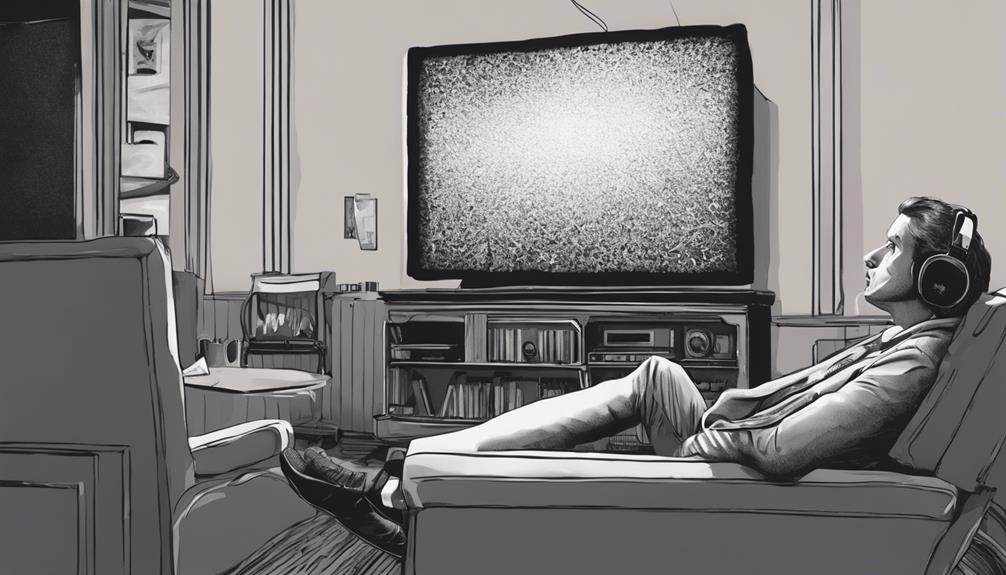As we consider the validity of early warning signs for potential hearing loss, we can’t help but question whether subtle changes in our auditory perception may be indicating a more serious issue.
From struggling to catch consonant sounds to feeling disconnected in noisy environments, the clues may be more nuanced than we realize.
However, understanding these signs and their implications could be the key to addressing a crucial aspect of our well-being that often goes unnoticed.
Key Takeaways
- Difficulty hearing consonant sounds and high-pitched tones.
- Struggling in noisy environments and needing higher volumes.
- Social isolation due to hearing challenges.
- Increased reliance on visual aids and written instructions.

Audien Atom One OTC Hearing Aids – Wireless, Rechargeable, and Comfortable | Clear Sound in a Small, Discreet Design for Seniors & Adults with Hearing Loss
Hear What Matters Most: Hearing isn’t one-size-fits-all. That’s why our adjustable frequency system lets you personalize your sound…
As an affiliate, we earn on qualifying purchases.
As an affiliate, we earn on qualifying purchases.
Difficulty Hearing Consonant Sounds
When experiencing difficulty hearing consonant sounds such as S, F, Th, Sh, V, K, and P, it may indicate early signs of hearing loss, particularly age-related hearing loss. As we age, changes in the inner ear structures or the auditory nerve can lead to difficulties in perceiving certain speech sounds, especially consonants. Age-related hearing loss, also known as presbycusis, often begins with high-frequency sounds like those produced by consonants. This type of hearing loss can impact our ability to understand conversations clearly, especially in noisy environments where consonants play a crucial role in distinguishing words.
Furthermore, struggling to distinguish between similar-sounding consonants may serve as a warning sign of potential deafness in older individuals. This difficulty in hearing specific speech sounds, particularly consonants, necessitates early detection to address potential hearing impairments effectively. By recognizing and addressing challenges in understanding consonant sounds in speech, individuals can take proactive steps to manage age-related hearing loss and maintain their quality of life.

Noise Cancelling Headphones for Kids, Kids Ear Protection 28dB SNR Noise Reduction Ear Muffs for 3-12 Years Toddler/Children, Noise Cancelling Headphones Hearing Protection For Fireworks/Monster Truck
🦊【Outstanding Noise Cancelling Performance】The Kids Noise Cancelling Sensory Earmuffs boast an exceptional SNR (Signal-to-Noise Ratio) rating of 28dB….
As an affiliate, we earn on qualifying purchases.
As an affiliate, we earn on qualifying purchases.
Disappearing Bird Sounds

Observing the diminishing presence of bird sounds could serve as an early indicator of declining high-frequency sound perception, potentially signaling the onset of hearing loss. Changes in the clarity, volume, or even absence of bird sounds, such as chirping and singing, may suggest a deterioration in the ability to detect high-pitched sounds.
Difficulty hearing birds in the morning or during outdoor activities could be a significant sign of high-frequency hearing loss. For individuals experiencing reduced enjoyment of birdwatching or nature due to challenges in hearing bird songs, it's essential to recognize these changes as potential early warnings of auditory decline.

SuperEar Model SE5000 (PSAP) for Seniors – Hearing Amplifiers for Seniors, Super Ear Personal Sound Amplifier, Sound Amplifier Listening Device and Audio Accessories in 50dB Ambient Sounds Increase
COMPATIBILITY: Response to sound amplification is completely dependent on an individual's unique ability to detect sounds. For this…
As an affiliate, we earn on qualifying purchases.
As an affiliate, we earn on qualifying purchases.
Struggling in Crowded Places
Struggling to discern individual voices in crowded places can serve as an early indicator of potential hearing loss. The presence of background noise in such environments can make it challenging to follow conversations and focus on specific voices. This difficulty in understanding speech amid competing sounds may lead to feelings of frustration and isolation, impacting social interactions and overall quality of life.
Many individuals with early hearing loss find it hard to filter out background noise, causing them to struggle in crowded settings.
The inability to distinguish between different voices in a noisy environment can be a common experience for those experiencing potential deafness.
Feeling overwhelmed or fatigued in bustling places due to the effort required to hear clearly is a common warning sign of impending hearing issues.

Multi-Condition Ear Seeds Acupuncture Kit 600 Counts, eBook Placement Chart, Probe, Acupressure Ear Chart, Tweezers
EAR SEED PATCHES: 600 counts of 2mm ear seeds on tan, skin colored long-lasting self-adhesive tapes.
As an affiliate, we earn on qualifying purchases.
As an affiliate, we earn on qualifying purchases.
Exhaustion From Straining to Listen

When we strain to listen, our bodies experience physical fatigue from the effort, leading to a sense of overall exhaustion.
This mental strain during communication can be draining, especially in social settings where multiple voices are present.
The constant work our brains do to piece together sounds and conversations can leave us feeling mentally and physically tired.
Physical Fatigue From Listening
Listening with untreated hearing loss can gradually lead to physical exhaustion and mental fatigue, impacting daily energy levels and overall well-being. The constant effort to catch sounds and understand speech can be draining, causing increased fatigue after social interactions.
Straining to hear puts a significant burden on the brain, making it work harder to fill in gaps in speech due to the loss of hair cells. This extra cognitive load can contribute to feelings of tiredness and overall fatigue.
Seeking assistance for hearing loss can help alleviate this strain and exhaustion, improving energy levels and enhancing overall quality of life.
Mental Strain When Communicating
The cognitive demands of compensating for hearing loss during conversations can result in significant mental fatigue and exhaustion. Struggling to fill in gaps in speech due to hearing loss requires heightened concentration, leading to a feeling of being mentally drained after social events that demand increased hearing effort.
This mental strain when communicating due to hearing loss can be emotionally taxing and impact one's overall well-being. Difficulty in understanding speech not only affects social interactions but also hinders daily activities, contributing to feelings of frustration and isolation.
Seeking professional help from a doctor or audiologist for solutions such as hearing aids is crucial in managing the mental exhaustion associated with hearing loss. It's essential to address these challenges proactively to improve communication and quality of life.
Persistent Ringing in Ears

Experiencing persistent ringing in the ears is commonly recognized as an early indicator of potential hearing loss. When the auditory system is compromised, it can manifest as tinnitus, which is often described as a ringing, buzzing, or hissing sound in the ears.
Here are some essential points to consider regarding persistent ringing in the ears:
- Underlying Damage: Tinnitus can signify damage to the delicate structures of the inner ear or the auditory nerve pathways.
- Progressive Nature: If left unaddressed, tinnitus may worsen over time, potentially interfering with daily activities and quality of life.
- Seeking Evaluation: It's crucial to consult with an audiologist if you experience continuous ringing in the ears, as early intervention can help prevent further deterioration of your hearing health.
Addressing tinnitus promptly through professional evaluation and appropriate management strategies is key to preserving your hearing abilities and overall well-being.
Changes in Volume Perception

Changes in volume perception can provide valuable insights into the early signs of potential hearing loss.
When the cells in your inner ear start to be affected, it can impact how you perceive sound levels. A decreased ability to hear whispers or soft sounds may be one of the first indicators of changes in volume perception.
If you find yourself struggling to hear the TV at a normal volume or have difficulty detecting subtle sounds like rustling leaves or distant conversations, it could signal alterations in your volume perception.
Moreover, needing higher volume levels for everyday sounds or experiencing sensitivity to loud noises that were once tolerable may also point towards changes in how your ears perceive volume.
Monitoring these shifts in your volume perception can help in identifying potential hearing issues early on, allowing for timely intervention and management to preserve your auditory health.
Muffled or Distorted Sound Perception

In the early stages of hearing loss, our perception of sound may become muffled or distorted, affecting our ability to discern high-pitched sounds like children's voices and crickets chirping. This alteration in sound perception can be unsettling and may indicate the onset of hearing issues.
Here are some key points to consider:
- High-frequency sounds, such as children's voices, may seem unclear or distant, making it challenging to understand speech in noisy environments.
- Difficulty detecting subtle sounds like crickets chirping could be a sign of deterioration in the inner ear's ability to process high-pitched tones effectively.
- Changes in high-pitched sound detection may lead to a sense of muffled speech, especially with sounds like 'f' and 's', impacting our ability to perceive certain consonants clearly.
These early warning signs highlight the importance of seeking professional evaluation to address any concerns promptly and explore potential solutions for maintaining optimal hearing health.
Avoidance of Social Situations

Navigating social situations can become increasingly challenging for individuals experiencing hearing difficulties, leading to a sense of isolation and avoidance of gatherings. Hearing loss can greatly impact one's ability to engage in conversations, follow group interactions, and feel connected in social settings. The frustration of not being able to hear clearly may lead individuals to prefer solitude over social interactions, ultimately affecting their mental well-being.
Avoiding social gatherings due to difficulty hearing and understanding conversations can result in feelings of being left out or misunderstood in group settings. Declining invitations to parties or events to avoid potential embarrassment from mishearing or misunderstanding can further exacerbate the sense of isolation. As individuals with hearing loss increasingly opt for solitude over social interactions, they may experience heightened feelings of loneliness and disconnection from others. It's essential to address hearing difficulties early on to prevent the negative impact on social relationships and overall quality of life.
Increased TV or Radio Volume

As we notice an increased reliance on high volume settings for TV or radio, it might be a sign of hearing difficulties.
When struggling to hear conversations clearly despite elevating the volume, it could indicate potential hearing loss.
Additionally, experiencing ringing in the ears alongside the need for louder sounds may suggest underlying issues that warrant professional evaluation.
High Volume Preference
Noticing a preference for high volume when watching TV or listening to the radio can serve as a crucial indicator of potential hearing loss. This early sign often goes unnoticed by the individual experiencing it but may be observed by others.
Here are some key points to consider:
- Gradually increasing the volume to hear more clearly is a common behavior for individuals with hearing loss.
- Family members or roommates might comment on the need for higher volume, indicating a noticeable change.
- Hearing specialists frequently inquire about volume preferences during assessments to better understand the extent of hearing difficulties.
Consistently requiring louder volume levels should prompt a proactive approach, such as seeking a comprehensive hearing evaluation, to address potential hearing concerns promptly.
Difficulty Hearing Conversations
Escalating the volume to comprehend conversations on TV or radio can be an early indication of potential hearing impairment. Difficulty hearing conversations at normal volume levels is a clear sign of a decline in hearing ability. Needing to raise the volume beyond usual levels to hear dialogue clearly may suggest underlying hearing issues.
Struggling to discern speech on the TV or radio without adjusting the volume could serve as a warning sign of potential deafness. A gradual escalation in volume settings for TV or radio to compensate for unclear speech is a common pattern seen in individuals experiencing hearing loss. It's essential to address these difficulties promptly to prevent further deterioration in hearing health.
Ringing in Ears
Persistent ringing in the ears, also known as tinnitus, can serve as an important indicator of potential hearing impairment. When experiencing tinnitus, individuals may find themselves resorting to raising the volume on electronic devices like TVs or radios. This habit can be a subtle yet crucial sign of underlying hearing issues.
Here are three key points to consider:
- Tinnitus, a persistent ringing in the ears, shouldn't be ignored, as it could signal hearing problems.
- Needing to increase the volume continuously to hear clearly might indicate a decline in hearing acuity.
- Gradually escalating the volume settings on devices like TVs may suggest a need for a hearing evaluation.
Difficulty Following Conversations

Struggling to hear and understand speech in noisy environments can serve as a crucial indicator of potential hearing loss. Difficulty following conversations, especially in crowded or loud settings, may indicate a decline in auditory perception.
When finding it challenging to keep up with discussions or needing frequent repetitions, it could suggest a hearing impairment. The frustration or exhaustion from the effort required to comprehend speech could point towards underlying hearing issues.
Changes in the ability to follow conversations, particularly in group settings, may signal the onset of deafness. These signs shouldn't be ignored, as they often represent early warnings of potential hearing loss.
If you notice yourself struggling to follow conversations or feeling overwhelmed in noisy environments, seeking a hearing evaluation can help in identifying any issues and exploring suitable interventions to address them promptly.
Trouble Hearing on the Phone

We've noticed that struggling to hear on the phone, particularly in noisy surroundings, can serve as a crucial indicator of potential hearing difficulties. Adjusting the call volume frequently or experiencing muffled sounds during phone conversations could be early signs of hearing loss.
Additionally, missing words or phrases on the phone, even with familiar voices, might suggest a need for a comprehensive hearing assessment.
Phone Call Volume
An increase in the volume needed to hear clearly during phone calls may indicate early signs of hearing loss. It's crucial to pay attention to changes in phone call volume, as they can be an important indicator of potential hearing issues. Here are some key points to consider:
- Adjusting phone volume frequently to hear conversations.
- Struggling to decipher words during phone calls even at high volumes.
- Feeling the need to use speakerphone or Bluetooth to improve call clarity.
These signs highlight the importance of monitoring your phone call experiences for any difficulties in hearing, as they could signify underlying hearing problems that may require attention.
Muffled or Distorted
Experiencing difficulty hearing clearly on the phone, especially when sounds are muffled or distorted, may serve as an early indication of potential hearing loss. Hearing loss can manifest as challenges in understanding speech over the phone, leading to frustration and communication breakdowns.
When phone conversations sound muffled or unclear, it could be a sign of emerging hearing impairment. Changes in phone call clarity, such as voices appearing distorted or distant, should prompt a hearing evaluation to address any underlying issues.
Persistent struggles in hearing phone conversations, even after adjusting the volume, warrant seeking advice from a healthcare professional for a comprehensive hearing assessment. Early detection and intervention in cases of muffled or distorted phone calls can help manage potential hearing loss effectively.
Missed Words or Phrases
Detecting missed words or phrases during phone conversations may serve as an early indication of potential hearing loss. Struggling to hear clearly on the phone, especially in noisy environments, could be an initial sign of hearing impairment. Increased difficulty in catching all the words spoken during phone calls might signal a decline in hearing acuity.
Here are some key points to consider:
- Missing words or phrases during phone conversations can be a sign of potential hearing loss.
- Struggling to hear clearly on the phone, especially in noisy environments, may indicate early deafness.
- Difficulty catching all the words spoken during phone calls could be a warning sign of hearing impairment.
Feeling Isolated Due to Hearing Issues

Hearing issues often lead to a sense of isolation, causing individuals to feel disconnected and lonely in social situations. When experiencing hearing loss, it becomes challenging to actively engage in conversations, follow along with group discussions, or even participate in social gatherings. The struggle to hear and understand others can result in withdrawing from interactions, leading to feelings of exclusion and detachment. This sense of isolation can have profound effects on one's mental well-being and relationships.
Untreated hearing loss can create barriers to effective communication, making individuals feel left out or misunderstood in social settings. The inability to fully grasp conversations or respond appropriately can further exacerbate feelings of isolation. As a result, people may start avoiding social situations altogether, impacting their overall quality of life. Recognizing these early signs of social isolation due to hearing issues is crucial in prompting individuals to seek help and intervention. By addressing hearing problems promptly, one can prevent the detrimental impact of isolation and improve social connections for a more fulfilling life.
Misunderstanding Spoken Instructions

As we navigate through daily tasks and conversations, our ability to comprehend spoken instructions plays a crucial role in our communication and understanding.
When confusion arises with directions or following conversations becomes challenging, it might signal a need to pay closer attention to our hearing health.
Instances of struggling to grasp verbal information may serve as early indicators of potential hearing loss, prompting us to seek professional evaluation for any concerns regarding our auditory perception.
Confusion With Directions
In situations requiring clear communication, individuals experiencing difficulties with hearing and processing speech may find themselves frequently misconstruing spoken instructions, leading to confusion and frustration. This can manifest as missing key details in directions, mixing up the sequence of steps provided, and asking for frequent repetitions or clarifications.
When trouble hearing hinders the ability to accurately interpret verbal guidance, individuals may rely more on visual aids or written instructions to supplement their understanding. The frustration of not being able to grasp spoken directions can be overwhelming, highlighting the importance of addressing any hearing issues promptly to enhance communication effectiveness and overall quality of life.
Difficulty Following Conversations
Struggling to accurately interpret spoken instructions, particularly in environments with background noise, may serve as an early indicator of challenges in following conversations. This difficulty could be a sign of underlying hearing loss. Individuals experiencing issues in understanding verbal information may find themselves frequently misinterpreting important details, leading to potential misunderstandings. To illustrate this further, we have compiled a table showcasing common signs that could indicate a hearing impairment affecting the ability to follow conversations effectively:
| Early Warning Signs of Hearing Loss |
|---|
| Misunderstanding spoken instructions |
| Struggling in noisy environments |
| Difficulty keeping up with group discussions |
| Asking for repetitions during conversations |
Asking for Frequent Repetitions

Experiencing the need for frequent repetitions in conversations is a common early warning sign that could indicate potential hearing loss. When I find myself constantly asking others to repeat what they've said, it may be a signal that my hearing isn't as sharp as it used to be. This could be attributed to various factors related to hearing loss, such as inner ear damage or nerve issues.
Signs to Look Out For:
- Struggling to catch every word spoken during discussions.
- Feeling the need to request multiple repetitions to grasp the full meaning.
- Finding it challenging to keep up with fast-paced conversations or group settings.
If the need for repetitive clarifications becomes a regular occurrence, it might be beneficial to seek professional advice and undergo a hearing assessment. Early detection and intervention can significantly improve the management of potential hearing issues and enhance overall quality of life.
Not Hearing Alarms or Doorbells

Not hearing alarms or doorbells can be a crucial indicator of potential hearing loss. Ignoring these essential auditory alerts may signify a decline in hearing sensitivity, pointing towards possible hearing impairment. When someone misses door knocks or phone notifications, it could be an early warning sign of hearing loss. Difficulty detecting high-pitched sounds like door chimes might suggest the beginning stages of deafness. Failure to react to crucial auditory signals such as smoke alarms can indicate a need for immediate hearing evaluation to prevent further hearing deterioration.
Innovations in hearing technology offer solutions to these challenges. Modern devices can amplify specific frequencies, enhancing the ability to hear alarms and doorbells more clearly. Furthermore, advancements in smart home technology allow for visual alerts linked to alarms, providing alternative means of notification for individuals experiencing hearing loss. Early detection and intervention are key in managing hearing loss effectively, emphasizing the importance of addressing issues like not hearing alarms or doorbells promptly to improve overall quality of life.
Frequently Asked Questions
What Are the Early Warning Signs of Hearing Loss?
We can identify early signs of hearing loss through various cues like:
- Difficulty hearing high-frequency sounds
- Relying on increased volume for audio
Conversational challenges, especially on the phone, and experiencing tinnitus are also indicators. Struggling in noisy environments can contribute to fatigue.
These warning signs warrant attention to prevent further hearing deterioration. Seek professional guidance if you notice these symptoms to address potential hearing issues promptly.
How Do I Know if I Am Going to Be Deaf?
We've heard concerns about potential deafness. One interesting statistic: 1 in 3 people over 65 experience hearing loss.
From personal experience, struggling to hear high-frequency sounds or feeling tired from straining to understand conversations could be early signs.
If you notice these warning signs, it might be wise to consult a healthcare provider for further evaluation. Remember, early detection and intervention can greatly improve outcomes.
What Happens Right Before You Go Deaf?
Right before we go deaf, subtle signs may appear, such as the gradual loss of high-pitched sounds and struggling to understand speech in noisy settings. This can lead to increased reliance on lip reading and a feeling of ear blockage.
Additionally, difficulty distinguishing dialogue from background noise may prompt adjustments in volume settings. These early warning signs indicate the onset of potential hearing loss, urging timely intervention and support.
What Is the First Stage of Hearing Loss?
When hearing loss first sets in, one may struggle to catch high-frequency sounds like consonants, leading to difficulty in noisy settings.
Fatigue can creep in as we strain to keep up with conversations. Tinnitus, that ringing in the ears, often accompanies this initial stage.
Increasing volume on devices becomes a habit to compensate for diminishing hearing. These subtle signs can hint at the onset of hearing loss, warranting early attention.
What Early Warning Signs Should Deaf Drivers Be Aware Of?
Deaf drivers should be aware of potential hazards like emergency vehicle sirens, car honks, and approaching trains. An alert system for deaf drivers, such as visual or tactile warnings, can help them stay safe on the road by providing crucial information they may not hear.
Conclusion
In conclusion, recognizing the early warning signs of hearing loss is crucial for seeking timely intervention and maintaining overall well-being.
For example, imagine a scenario where a middle-aged man named John noticed he was struggling to understand conversations and frequently asked for repeats. After seeking professional evaluation, he was fitted with hearing aids that significantly improved his quality of life.
By being proactive and addressing potential hearing issues early on, individuals like John can continue to fully engage in the world around them.










